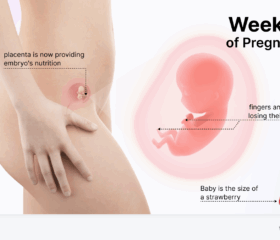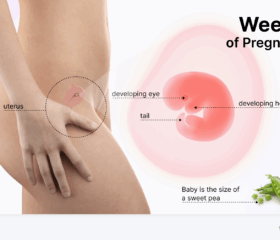Pregnancy Week by Week
25 Weeks Pregnant
Your baby is as big as an eggplant.
13.6
inches
1.46
pounds
25 Weeks Pregnant: Symptoms, Baby’s Growth, & Tips
As your baby continues her development, you’re likely noticing changes to your own body. You might also be feeling a mix of symptoms—some of them new, others old. Read on to find out what you can expect at 25 weeks pregnant.
Your baby's development at 25 weeks
At 25 weeks, your baby is about the size of an eggplant, measuring around 13.6 inches long and weighing just a little under 1.5 pounds. 1
Here’s what else is happening with your baby this week:
- Plumping up: Someone’s getting chubbier! She’s quickly gaining baby fat, which will smooth out her wrinkled skin. 2
- Developing equilibrium: Your little one is getting a better sense of which way is up and down. 3
- Grasping reflex: Her hands are now fully formed, and she may be grabbing at her umbilical cord. It won’t be much longer until she’s grabbing your hand. 4
- Sleep cycles: Your baby is spending most of her time in REM sleep. 5
- Lung development: Your baby’s lungs are also developing blood vessels and starting to produce surfactant, a substance that will help her breathe after birth. 2 Although she isn’t breathing actual air, your baby is also making practice breathing movements, taking in amniotic fluid. 6
- Sensory development: Your baby’s senses are becoming more refined. She may now be able to hear your voice and react to loud noises. This week will also be the first time she opens her tiny eyes. 7

Your body at 25 weeks
It’s not just your baby who’s changing every day. This week, you may also notice a few other changes in your body, such as:
- Skin changes: Your skin may feel tight and itchy, especially on your belly and breasts, as it stretches to accommodate your growing baby.
- Hair growth: Not all changes are necessarily unwelcome. You may notice your hair is looking thicker and fuller than it used to.
- Vision changes: You might experience changes in your vision, such as blurriness or dry eyes. This is usually temporary and will fade after delivery. If you do have blurry vision, however, you should speak to your doctor, as this could also be a sign of preeclampsia or gestational diabetes. 89
- Hemorrhoids: These swollen veins in the rectum are a common and often painful side effect of pregnancy. 10
Your belly at 25 weeks
Your baby bump is really starting to show. At 25 weeks, your uterus is roughly the size of a soccer ball, giving you a very pronounced baby belly. 11
You’ve probably put on quite a bit of extra weight, too, which is normal. Most doctors recommend gaining around 1 pound per week during the second trimester. 12 Don’t be dismayed—this extra weight is all going to good use.
Your symptoms at 25 weeks
You might see new symptoms show up as a result of your changing hormones. While pregnancy symptoms vary from mom to mom, common ones include:
- Dizziness and palpitations: Your body’s blood volume has increased significantly, which can cause you to feel dizzy or have heart palpitations.
- Frequent urination: Finding yourself running to the bathroom more often? Your baby is putting pressure on your bladder, which means more trips to the restroom.
- Digestive problems: Your digestive system slows down considerably during pregnancy, which may make you constipated. This can also bring about another unpleasant symptom: excessive gas and bloating.
- Heartburn: Many pregnant women suffer from heartburn. While this is believed to be caused by your increased progesterone levels (which may cause heartburn to start as early as the first trimester of pregnancy), upward pressure from your growing uterus could also be a culprit. 13
- Carpal tunnel syndrome: You might experience tingling or numbness in your hands and wrists due to increased fluid retention.
- Restless legs syndrome (RLS): You may feel a tingling sensation in your legs, along with an urge to move them, especially at night.
- Symphysis pubis dysfunction (SPD): You may experience pelvic pain during your pregnancy as a result of your relaxed ligaments.
Braxton Hicks contractions
At this stage, many women also experience Braxton Hicks contractions. It can be easy to mistake them as a sign you’re going into labor, especially as a first-time mom.
However, you can think of these as “practice contractions.” Unlike labor contractions, Braxton Hicks contractions usually aren’t painful or regular. They do indicate that your body is gearing up for the big day, but they don’t mean your baby has decided to come early.
Braxton Hicks contractions tend to be shorter than true labor contractions. Try using a pregnancy tracker app to time them.
When to speak with your doctor
Your doctor is always on hand if you have any concerns. It’s especially important to speak with them straight away if you experience severe headaches while you’re pregnant or notice any other concerning symptoms, such as: 14
- Heavy bleeding (i.e., bleeding that soaks through a pad)
- Your baby moving less than usual
- Sudden swelling on your face, hands, or feet
- Pain in the upper abdomen
These symptoms can indicate complications such as preeclampsia, which can be life-threatening. If you do get them, stay calm. They could also come from something less concerning, and even major complications are treatable if you catch them in time. The best thing to do is get to your doctor as quickly as possible.
How to care for yourself and your baby at 25 weeks
As you move further into your second trimester, take steps to look after yourself and your ever-growing baby. Here’s how to care for yourself and your little one at 25 weeks:
Stay hydrated
Make sure you’re drinking enough water: at least 8–12 cups per day, to be specific. 15 Staying hydrated can help some of those troublesome symptoms like constipation or bloating, as well as improve your overall health.
Eat a balanced diet
No matter how good that second piece of cake looks, you’ll need to eat well for both you and your baby. Include whole, fresh foods, plenty of iron, and high-fiber options in your pregnancy diet to aid digestion. Avoid spicy, fatty, and acidic foods, and try eating smaller meals more frequently to combat heartburn.
Stay active
Gentle exercises like walking can help with constipation during pregnancy, keep you energized, and improve your sleep. If you’re interested, prenatal exercise classes can give you the guidance you need, as well as let you meet other expectant moms. Try out Kegel exercises to strengthen your pelvic floor muscles, which will be helpful during labor.
Get enough rest
While it’s good to stay relatively active, your body’s going through a lot, so put aside time to rest. Aim for 7–9 hours of sleep each night, and try using a pregnancy pillow if you’re finding it hard to get comfortable at night and suffering from pregnancy insomnia. If you fancy treating yourself, you can opt for a massage, but make sure to go to a reputable parlor with a masseuse trained in prenatal massage.
Look after your health
You’ll need to look after your physical health as you get closer to your due date. Make sure you’re up-to-date with your recommended vaccinations; you can get the flu shot while you’re pregnant, as well as the COVID-19 vaccine and Tdap shot. 16
If you need them, some antibiotics are considered safe for use during pregnancy, but consult your doctor about the best option for you. 17
Get support for your mental health
Pregnancy can be an enjoyable time, and it’s certainly never boring, but it’s normal to also struggle with your mental health. If you’re feeling down, talk to your doctor as soon as you can.
Depression and anxiety can sometimes be caused by your surging hormones during pregnancy—and even if they aren’t and there’s another cause, it’s important to get the help you need to get your emotions back on track.
Getting ready for your little one’s arrival
With the third trimester soon approaching, it’s a great time to start getting ready for your baby’s arrival. Here’s how you can get ahead and prepare:
- Plan your nursery: Start thinking about the space where your baby will sleep. If you’re into DIY, making a nursery can be great fun.
- Financial planning: As much joy as your little one will bring, she’ll also be costly! Review your finances and explore options for life and disability insurance, college savings accounts, and how your baby will affect your tax status.
- Maternity leave: Research your company’s maternity leave policy, including FMLA options, paid time off, and how you can combine them.
- Baby gear: Start making a list of the items you need. This includes car seats, a place for the baby to sleep, and, of course, plenty of diapers.
- Baby names: This can be one of the most enjoyable parts of your pregnancy … and one of the most potentially stressful. If you haven’t settled on a name yet, start brainstorming ideas now.
- Bra shopping: Now is also a great time to look into more comfortable bras, including nursing bras.
If you’re feeling overwhelmed, try making checklists in your pregnancy app. The best pregnancy trackers offer reminders and to-do lists to keep you organized.
Make sure your baby has her own bed
It’s important for your baby to have her own bed. Many parents can’t wait until their children are ready to crawl in bed with them at night, but the American Academy of Pediatrics (AAP) recommends you not share your bed with your baby for the first six months.
Final thoughts
Well done on reaching week 25 of your pregnancy. That due date doesn’t feel as far away as it once did, does it?
It’s time to celebrate, so take time for yourself and do something you enjoy, especially while you’ve still got that extra second-trimester energy.
Remember to listen to your body. If any symptoms are worrying you, don’t be shy about contacting your doctor, even if you just need reassurance.
You’re doing great! Soon enough, you’ll be welcoming your newborn into your home.
Article Sources
- Baby Your Baby. "Fetal Growth Chart" Retrieved June 25, 2025.
- The Birth Company. "Week 25 of Pregnancy (Days 175-181)" Retrieved June 25, 2025.
- WebMD. "What's It Like in the Womb?" Retrieved June 25, 2025.
- International Journal of Pediatrics. "The Grasp Reflex and Moro Reflex in Infants: Hierarchy of Primitive Reflex Responses" Retrieved June 25, 2025.
- Mayo Clinic. "Pregnancy week by week" Retrieved June 25, 2025.
- Encyclopedia of Respiratory Medicine, 2006. "Fetus Breathing" Retrieved June 25, 2025.
- Pregnancy, Birth and Baby. "Pregnancy at week 25" Retrieved June 25, 2025.
- Saudi Journal of Ophthalmology. "The eye and visual system in the preeclampsia/eclampsia syndrome: What to expect?" Retrieved June 25, 2025.
- National Health Service. "Gestational diabetes" Retrieved June 25, 2025.
- Tommy’s. "25 weeks pregnant: baby's development, stomach pain and planning the birth" Retrieved June 25, 2025.
- American Pregnancy Association. "25 Weeks Pregnant" Retrieved June 25, 2025.
- Mount Sinai. "Managing your weight gain during pregnancy" Retrieved June 25, 2025.
- Johns Hopkins Medicine. "Pregnancy and Heartburn" Retrieved June 25, 2025.
- National Health Service. "Pre-eclampsia" Retrieved June 25, 2025.
- American College of Obstetricians and Gynecologists. "How much water should I drink during pregnancy?" Retrieved June 25, 2025.
- U.S. Centers for Disease Control and Prevention. "COVID-19 Vaccination for Women Who Are Pregnant or Breastfeeding" Retrieved June 25, 2025.
- The Women's. "Antibiotic use in pregnancy" Retrieved June 25, 2025.







